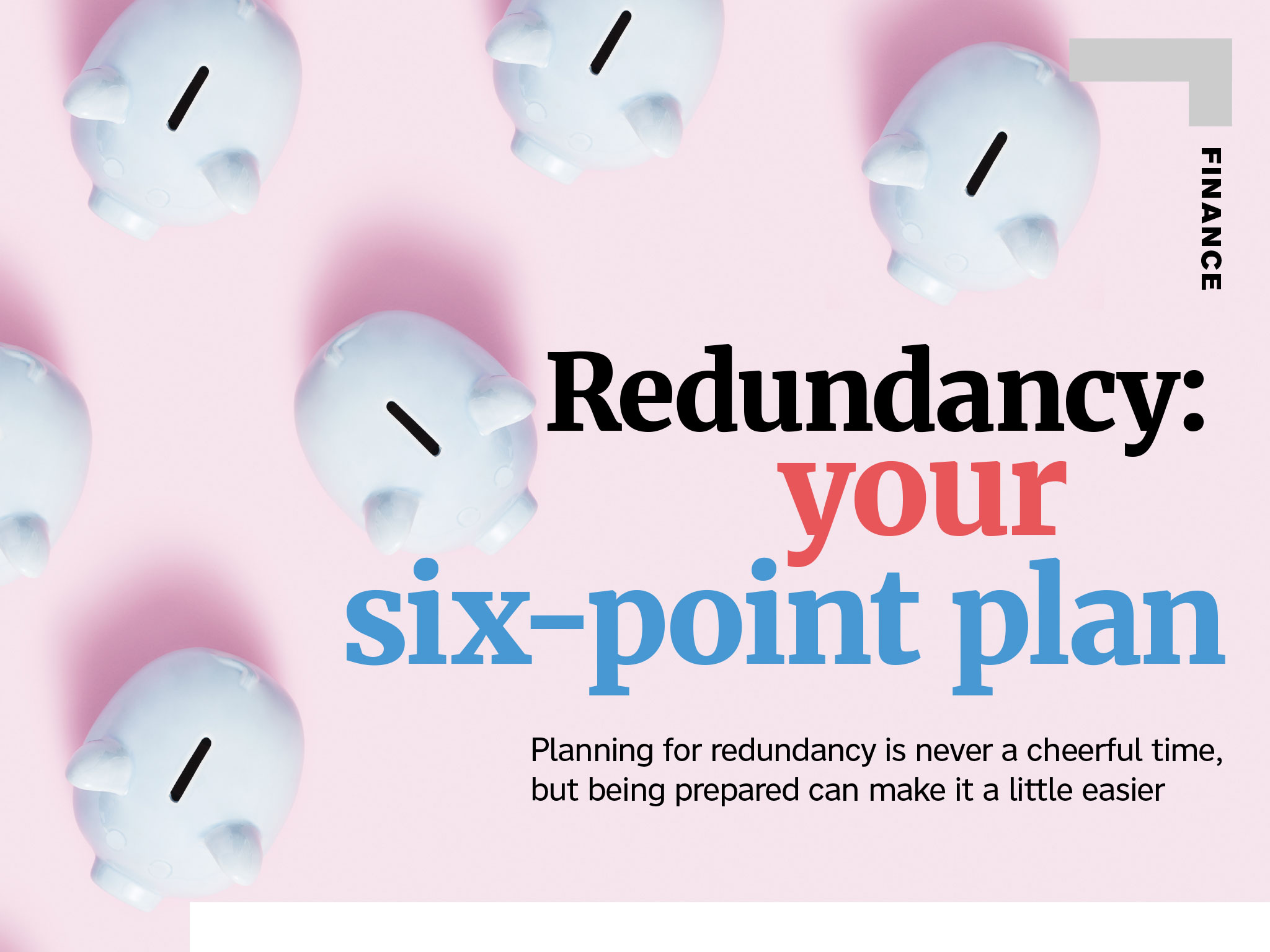
























Six-point plan 1 Assess your budget requirements 2 Your savings/ redundancy payment 3 Debt management 4 Claim what you are due 5 Potential early retirement 6 Try something different Planning for redundancy is never a cheerful time, but being prepared can make it a little easier By Darren Williams obvious, it is very important to consider exactly what this means. In most instances, your outgoings will remain broadly the same, so it is important to budget carefully in the short term. Look at your outgoings and try to split them between ‘must have’ and ‘nice to have’. Clearly, mortgage payments and energy bills – as well as food and insurances – must take priority. Take the opportunity to consider how important gym membership, or the full Sky TV package, is for the moment. These things can be started again once things improve, and small savings now could make all the difference. 2 Your savings/redundancy payment If losing your job was part of a redundancy package, you may have received a redundancy payment. You need to have been employed for a minimum of two years to receive redundancy; the first £30,000 is paid tax free, with any excess taxed as income. It may be best to avoid blowing this on kitchens, holidays or a new car; this lump sum – and any further savings you have – will be needed to manage your budget. You may have an expectation of picking up a new job easily, but this may not happen. Surely the kitchen can wait until the new job is found. In our previous article (‘Throw off the financial shackles’, Autumn 2019) , we highlighted the need for a rainy-day fund equating to at least three months’ income. Redundancy is unquestionably classed as a ‘rainy day’, so this asset should be used to support you. Do try to budget early on, however, to ensure your lump-sum investment lasts as long as is required – and don’t forget to top it back up again once you are in employment. It served you well once, and may need to do so again. 3 Debt management Debt can cripple you. Credit card debt is especially expensive, so take the opportunity to pay it off if you can. If you can’t, contact the credit card company and explain your position – they can often be very helpful. It is also important to contact your mortgage provider if you have one. They may offer a payment holiday, or may simply increase the term of your loan to reduce your monthly payments. Try to budget early on to ensure your lump-sum investment lasts as long as is required 4 Claim what you are due If you have been made redundant, you can claim Jobseeker’s Allowance (or Universal Credit, if it has been rolled out in your area). When all is said and done, you have paid plenty of National Insurance (NI) for this very reason. It only pays around £79 a week, but it will at least provide a small element of guaranteed income. It also ensures you gain NI credit for the purposes of state-pension provision. 5 Potential early retirement If you are over 55 (the earliest age at which you can draw a personal pension), you may think about early retirement. Losing your job may have been thrust upon you, but it may be that the redundancy provided and other assets you have are sufficient for you to consider retirement. 6 Try something different You may see redundancy as an opportunity to try something completely different: start your own business, train for a new role, or throw yourself into the voluntary sector. This change of circumstance may be the push you need to grasp the ‘training’ nettle. If your resources allow it, this may be the chance to write that book, build that car, lower that handicap or paint that landscape. So, is this the end of something or the start of something? That depends on your individual circumstances, but it is important to remain active, talk to your family – as it will affect them, too – listen to advice, and continue to plan. Clearly, your budget and savings will have a big say in your next move, and this could be a difficult time. But getting your finances (especially debt management) in order is a very wise thing to do, and will help you in the next stage of your life plan. If you have any tips to share, we would be pleased to hear from you. Email TheLog@balpa.org Redundancy: your six-point plan e make no apology for re-running Darren Williams’ recently published article (first seen in the Winter 2020 issue of The Log). The crisis of redundancy has struck pilots particularly hard in these strange and difficult times. For many, job loss has already happened. For others, the very real threat remains – and it is conceivable that the loss of employment as a pilot may be permanent for many. Review these six guidelines and consider taking action where necessary. And good luck. 1 Assess your budget requirements Losing your job will mean your income reduces dramatically. While this sounds FINANCE Redundancy: FINANCE Redundancy: your FINANCE Redundancy: your six-point plan FINANCE Redundancy: your six-point plan Planning for redundancy is never a cheerful time, but being prepared can make it a little easier FINANCE Redundancy: your six-point plan Planning for redundancy is never a cheerful time, but being prepared can make it a little easier By Darren Williams FINANCE